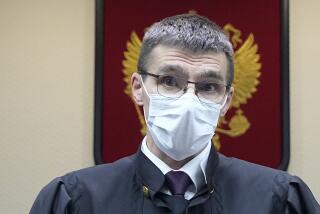Yeltsin Yields on Constitution Criticism : Politics: Court frowns on Russian president forbidding rivals from faulting his proposal.
- Share via
MOSCOW — Amid howls from friends and foes alike, Russian President Boris N. Yeltsin on Wednesday backed off and allowed the 13 parties competing for seats in the new legislature to publicly criticize his draft constitution.
Yeltsin had warned last week that any party lashing out at the constitution would lose its state-sponsored television time.
“The free time will be taken back from you if you deviate from your subject, and your subject is your platform,” Yeltsin had said. “I ask you not to touch on the constitution.”
The president’s warning was followed by a formal complaint filed by First Deputy Prime Minister Vladimir F. Shumeiko, who asked that the Communist Party and the anti-Yeltsin Democratic Party of Russia be banned from participating in the Dec. 12 election because their leaders had criticized the constitution.
But the president’s handpicked Information Arbitration Court ruled Wednesday that such a ban would be illegal--and the president’s own party disavowed Shumeiko’s move.
In one of the flip-flops that have characterized the president’s rule-by-decree, Yeltsin’s spokesman denied that the president had ever set any restrictions in the first place and said “constructive criticism” of the constitution will be welcome.
Yeltsin’s about-face may have come with the realization that the danger of looking like a dictator by banning criticism outweighs the danger posed by having foes continue to accuse him of promulgating a constitution that gives him dictatorial powers.
Shumeiko’s call for a ban on the two parties went far beyond the president’s threat to pull the plug on their TV time.
It drew rage and ridicule not only from Communists and hard-liners but also from Yeltsin’s chief democratic rival, free-market economist Grigory Yavlinsky.
“The current leaders are losing even the elementary notion of democracy,” Yavlinsky said in a statement quoted by the Reuters news agency. “If we fail to notice that, then the next step from authoritarian rule to dictatorship will soon be with us.”
The arbitration court ruled that all candidates may “independently determine the form and contents of their electoral performances and speak out on any issue, including the draft constitution,” which will be submitted to voters on the Dec. 12 ballot.
Also Wednesday, the Central Election Commission banned publication or broadcast of the results of election-related public opinion polls until after the election.
The 10-day ban is similar to poll blackouts adopted by other countries. France, Spain, Luxembourg, South Africa and Bulgaria have bans for periods ranging from five days before the election to the duration of the election campaign.
An expert on polling in Europe said such bans succeed in keeping polling information only from ordinary voters, while politicians and business leaders continue to use the polling data to personal advantage.
“The minute the embargo on polls kicks in, politicians hint to the press that they’re gaining, if they’re behind, or that they’re holding, if they’re losing ground,” said Robert Worcester, chairman of Market and Opinion Research International in London. “Since there’s no way to refute it on a factual basis, it gives every incentive for politicians to lie to the public.”
Two recent polls indicate that Russia’s Choice, the party that officially supports Yeltsin, leads the field with more than 26%. Yavlinsky’s party is in second place, with more than 10%. The Communist Party polled between 6.6% and 8%.
But only 43% of those surveyed were likely to vote on Dec. 12, according to the All Russia Center for Public Opinion Research survey.
The draft constitution will be adopted only if more than half of all registered voters turn out.
More to Read
Sign up for Essential California
The most important California stories and recommendations in your inbox every morning.
You may occasionally receive promotional content from the Los Angeles Times.













